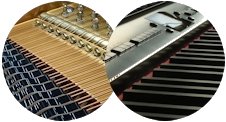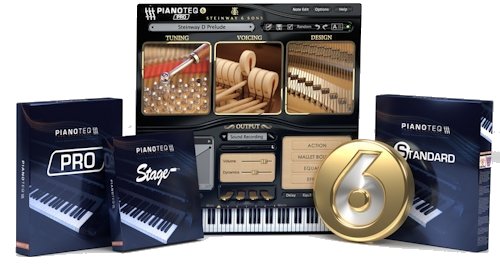|
|
|
Digital Piano Technology
 |
Although traditionally from the 'old
school', new technology has always been fascinating, so I try to
embrace it. Since the birth of the synthesiser and electric
piano, I have dabbled with many of these new keyboards with
varying degrees of satisfaction.
I still have a vivid memory from my
student days and the first time I played a brand new Bosendorfer
grand piano in the concert hall of the music college. I was
blown away. I remember just playing one note at a time and being
in ore of the wonderful tone of each single note. That's a big
deal to try and emulate using technology and a set of speakers,
and it hasn't happened yet.
Yamaha's digital pianos claim to be
sampled from their CFX grand piano. The CFX grand is priced at
around £98,000. If these digital sampled pianos could accurately
mimic the CFX, I doubt they would be selling them for the £2000
to £6000 mark.
Now to the positive side.
The latest digital pianos do sound better than some of the
traditional upright pianos I have played. Yes, I really did just
say that, me from the old school. The key action is excellent,
and I don't see any reason for modern technology not to crack
that one.
They also have features you can't get on a traditional piano.
Pop on a pair of headphones or turn
the volume down and you can practice to your hearts content
without disturbing neighbours or family. Let the piano show you
how the piece should be played and correct your errors. Slow
sections down for accurate rhythm practise. Record your
performance and then cast your critical ear over the result. For
teaching and learning, the digital piano is a must have.
Sampled Sounds and the new
Physical Modelling.
Sampled Sounds.
Until recently, digital pianos have
used recordings of grand piano notes to trigger each key, and
each note has a different recording for certain (but not all)
volume levels. These sampled pianos are also available in pc
software and can be triggered by any digital piano with a midi
connection. This all seems great, we can have samples of all the
great piano manufacturers, Steinway, Bosendorfer, Bechstein,
Bluthner, etc.
The reality, I find, is not so good.
I have yet to find a digital piano, or software piano that does
not have some sort of anomaly in certain notes or range of
notes. Whether it is in the recording or a sympathetic vibration
between the speakers and the environment on certain notes, I am
not sure, but it exists. Some notes just sound odd, they have
extra high frequencies, or simply don't sound like they are from
the same make of piano.
Physical Modelling.
Physical modelling creates the piano
sounds in real time using software algorithms. The software
creates and combines the various tones from each part of the
piano, from the strings to the hammers to the sound board, as
you play.
The result is remarkable. A more realistic sound than any I have
heard, and with an even tone throughout. It is also more
expressive, as every tone is created according each notes volume
level from 0 to 127. There is also no limit to the number of
notes that can be played together (polyphony).
Every note can be individually
adjusted with a multitude of parameters, so if you have any
speaker resonance problems they can be ironed out, or you can
tailor the sound to suit.
The company responsible for this
system is
Modartt,
and the software is called
Pianoteq 6.


I now use Pianoteq Pro with a Yamaha
CLP 575 digital piano and two extra digital monitor speakers to
give more clarity, making it a 6 speaker system.
My personal favourite instrument is the Steinway Model B Grand
Piano, it has a superb tone, more natural and expressive than
Yamaha's own CFX sampled tones.
I use the 'Prelude' preset with several adjustments made to
individual notes to match the environment.
The 'Recording' presets on the Steinway models B and D are great
(without any note adjustments) for recording your performances.

Roland have now started to use the physical modelling system in
their new digital pianos.
The LX7, LX17 and GP607 pianos all sounded good to me,
although it takes more than my half hour trial to really get to grips
with the sounds and nuances of any piano.
|
|

